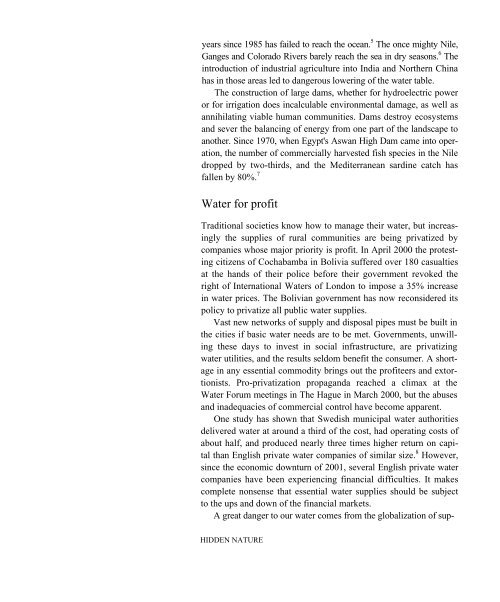levitational current - Free Energy
levitational current - Free Energy
levitational current - Free Energy
Create successful ePaper yourself
Turn your PDF publications into a flip-book with our unique Google optimized e-Paper software.
years since 1985 has failed to reach the ocean. 5 The once mighty Nile,<br />
Ganges and Colorado Rivers barely reach the sea in dry seasons. 6 The<br />
introduction of industrial agriculture into India and Northern China<br />
has in those areas led to dangerous lowering of the water table.<br />
The construction of large dams, whether for hydroelectric power<br />
or for irrigation does incalculable environmental damage, as well as<br />
annihilating viable human communities. Dams destroy ecosystems<br />
and sever the balancing of energy from one part of the landscape to<br />
another. Since 1970, when Egypt's Aswan High Dam came into operation,<br />
the number of commercially harvested fish species in the Nile<br />
dropped by two-thirds, and the Mediterranean sardine catch has<br />
fallen by 80%. 7<br />
Water for profit<br />
Traditional societies know how to manage their water, but increasingly<br />
the supplies of rural communities are being privatized by<br />
companies whose major priority is profit. In April 2000 the protesting<br />
citizens of Cochabamba in Bolivia suffered over 180 casualties<br />
at the hands of their police before their government revoked the<br />
right of International Waters of London to impose a 35% increase<br />
in water prices. The Bolivian government has now reconsidered its<br />
policy to privatize all public water supplies.<br />
Vast new networks of supply and disposal pipes must be built in<br />
the cities if basic water needs are to be met. Governments, unwilling<br />
these days to invest in social infrastructure, are privatizing<br />
water utilities, and the results seldom benefit the consumer. A shortage<br />
in any essential commodity brings out the profiteers and extortionists.<br />
Pro-privatization propaganda reached a climax at the<br />
Water Forum meetings in The Hague in March 2000, but the abuses<br />
and inadequacies of commercial control have become apparent.<br />
One study has shown that Swedish municipal water authorities<br />
delivered water at around a third of the cost, had operating costs of<br />
about half, and produced nearly three times higher return on capital<br />
than English private water companies of similar size. 8 However,<br />
since the economic downturn of 2001, several English private water<br />
companies have been experiencing financial difficulties. It makes<br />
complete nonsense that essential water supplies should be subject<br />
to the ups and down of the financial markets.<br />
A great danger to our water comes from the globalization of sup-<br />
HIDDEN NATURE








![The Big Lie 9-11 and Government Complicity in Mass Murder [PDF]](https://img.yumpu.com/50957077/1/190x245/the-big-lie-9-11-and-government-complicity-in-mass-murder-pdf.jpg?quality=85)








